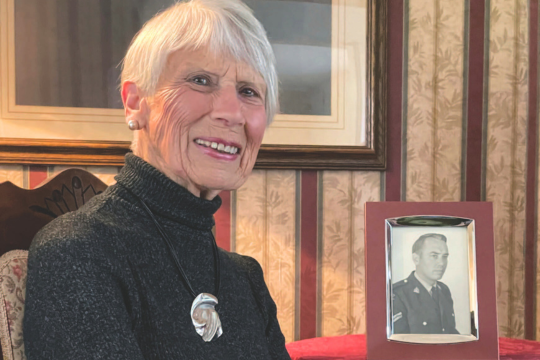
Dorothy McIntosh helped her husband run the detachments he led over a 27-year career with the RCMP in Nova Scotia.
Dorothy McIntosh remembers it well. She had just made breakfast for her husband, RCMP Corp. Don McIntosh, and his dog-master colleague who had spent the night at their Springhill, N.S., home. Don was in charge of the detachment and he had called in colleagues from near and far after a jailbreak occurred at the Springhill Penitentiary.
“[The colleague] looked at me and asked me if I knew how to handle a revolver,” Dorothy says. Because Don and Dorothy’s home doubled as the RCMP detachment for the area, the colleague was saying she could be the one dealing with the inmates if they decided to give themselves up. Dorothy said she didn’t know how to use a revolver, and promised to stay home and keep the doors locked.
“Sunday evening was when these guys escaped,” she says. “Because Don was on patrol, I got the call from a resident who recognized one of the inmates on Main Street. I let Don know and he asked me to call the penitentiary and confirm this person was missing.
I called and they checked and determined it wasn’t just him, there were three others.”
Soon word came in that the foursome had broken into a store and stolen knives, making their escape even more high-stakes. Eventually, with reinforcements from around the region to help track down the inmates, they were all caught and returned to Springhill. No revolver necessary, but with Dorothy often serving as dispatcher, it becomes clear the RCMP relied on her to some extent, as did Don, who had a 27-year career, ultimately as a sergeant between Cape Breton, Windsor, Halifax, Springhill, Truro and Bridgetown, N.S.
“I didn’t have to answer the door, or the phone, but all the wives did it to help their husbands,” she says. Don, in those days, was on duty for his regular 40-hour work week, and on call the rest of the time, effectively having to be available day and night. She, meanwhile, while being at home and raising their two children, Arlene and Andrew, would take calls and relay messages to officers day and night. Sometimes she even typed up reports.
And did she ever feel she should be compensated for this work?
“No, I never thought they should be paying me,” she says, adding that one of her fellow wives — it was the ’60s and ’70s, and most spouses were indeed women — felt some recognition would be nice. That eventually came in the form of a nice dinner in Halifax, Dorothy says.
“They held a lovely event and presented us with pins and plaques,” she says. “I have no regrets. We were very fortunate.”
Don and Dorothy were settled in Bridgetown, N.S., when Don retired in 1983, after which he went on to work as a social worker in Bridgetown for 14 more years. He served as president of the Western Valley branch of the forerunner of today’s National Association of Federal Retirees and died four years ago, in 2020. Dorothy continues to be an active member of Federal Retirees to this day.

